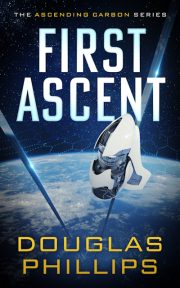Guest Post: Writers and Pellets
by Tobias Buckell
A good friend asked me to write about my pigeons and pellets story I’ve been telling friends for the past year.
It goes something like this…
When I talk to writers I often reinforce the importance of milestones versus goals.
Milestones are things you’d like to have happen to you. Selling a story. Selling a novel. Getting nominated for an award. Winning an award.
Goals are things you can actually achieve. Finishing writing a story. Writing a certain number of words. Writing a certain kind of story.
Too many people, when they create lists of goals they’d like to achieve in their year, choose to list milestones over which they have little control. Saying you’d like to sell a novel as a ‘goal’ is possibly not in your control. The market may not be right. You may not have written a good novel. But you can certainly somewhat control writing a novel and submitting it.
This failure to pay attention to what we can control as authors and what we can’t leads to a form of Cargo Cult neuroses in writers out of a desire to recreate milestone successes that were never in their primary power to recreate.
You see it in new writers who look at rejection letters, trying to figure out what they ‘mean.’ It’s jokingly called ‘rejectomancy’ by more experienced writers. You see it in writers who keep trying to write the same kind of story because the first one in that vein succeeded.
The neurotic behavior persists at all levels of writing. It isn’t necessarily the writer’s fault.
The reason for this is writing, as well as many of the arts, is fundamentally (but accidentally) designed to create horrible psychological atmospheres that are very conducive to creating neuroses if you aren’t paying attention. Because the reward systems for artistic success aren’t predictable. Which really fucks with the animal brain.
I’m now going to talk to you about pigeons and pellets.
I was reading about an experiment where researchers dropped pigeons (or some other bird) pellets from a tube. At first, they could tap on the tube, and they’d get a pellet. Then things were changed. It was done randomly, so what happened was that the pigeons basically went batshit crazy trying to figure out just what the fuck it was they were doing that was causing the pellets to drop.
It’s fairly well known that if you want to mess an animal’s training up, you just need to create an environment in which it doesn’t know whether you’re going to smack the crap out of it or pet it.
So come back to our writer-pigeon self.
Writers work for a variety of types of pellets, and a lot of it depends on their own psychological make up. Many of us are narcissists. It’s not just about the money, we quite honestly think we have something to say or share with the world. Having the world react to that is one kind of pellet. Some of us need to put food on the table. That’s another kind of pellet. Some of us seek validation. That’s another kind of pellet. There are lots of pellets.
But unlike a standard 9-5 job, even in terms of income for a writer, you never have any real idea what sort of pellets are coming you way.
Income? It depends on how well someone else thinks your book may sell, how powerful your agent is, how awesome the book is, and what the publisher’s line up and budget may currently be in some sort of synergy. That’s the advance. After that, it depends on how readers react and word spreads. Foreign rights? All of the above plus idiosyncrasies about how languages and stories translate.
Attention? Will readers love you for the reasons you want to be loved? Ever see a sad author who sells well but hates the series he’s slugging through? You can’t control how critics react. The darling of the moment is no less surprised when their book explodes out. No one’s planning on being a major critical hit, even if they’d dreamed and hoped.
And even when income and attention hit, they do in non-predictable ways according to the chaos theory and general brownian motion that’s a coalescence of readers, thought-leaders, and delivery mechanisms. There are so many variables in all of that that some books pop right away, some take years. Some pop after the writer’s dead.
But those pellets, those rewards, come in. And they come in intermittently and out of the writer’s control.
But these pellets *are* recognizably the result of the author’s work. They wouldn’t come if the author hadn’t been pushing away at the lever (writing). It’s just, you don’t know which lever push made it happen.
And the danger is, whatever the author happens to think they were doing that caused the success is what was being rewarded. Or, they have no idea how the pellets are coming their way, and it creates panic, confusion, despair, frustration, and more fun things.
Even sadder, those reactions to random pellets often get in the way of doing the one thing that is needed for the writer to get more pellets:
write more.
Early on in my career I hit upon a method of focusing and rewarding only the activities that I could control. I knew I wanted to sell a story, but that it was a random pellet. So I focused on writing and submitting stories. No one could stop me from that. I celebrated every 100 rejections (with champagne and nice food and a little mini-celebration) I got as proof that I was laying down the right actions toward hopefully getting a story sold.
I still engage in this action. In fact, one consequence of my near-miss with death in late 2008 was to focus even closer on the basics and reward. What is important is the writing. Getting better at the writing. Writing as much as I can comfortably write and reward myself for that. Reward myself for doing those things which I can control.
Anything I can control, I pay close attention to. Contracts. Personal relationships. The words. Stories I want to tell.
There are lots of things I pay attention to and track (sales, publicity, attention), just as a pigeon is happy to get those random pellets. But I do my best to keep the focus where it needs to be.
That is not to say I don’t enjoy milestones. I fucking love milestones. But I celebrate them as just that. But, particularly over the last two years, learned to not anticipate them.
All I can truly anticipate and control are tonight’s pages, chapters, sentences, rewrites.
I’m going to spend the rest of my life as a story teller. I have to love the moment. The moment of creating story. Refining story. Or I’m going to be miserably trying to get those pellets by flailing around randomly. And that doesn’t sound like a fun way to spend the next decades of my life.
•••
Tobias S. Buckell is a Caribbean born SF/F author and NYT best seller who now lives in Ohio. He is the author of Crystal Rain, Ragamuffin, Sly Mongoose, Halo: The Cole Protocol and over forty short stories in various magazines and anthologies. His next novel, Arctic Rising, is due out in 2012 from Tor, and he’s working on his next book. Find him at www.TobiasBuckell.com.
This post originally appeared on Tobias Buckell’s weblog.



